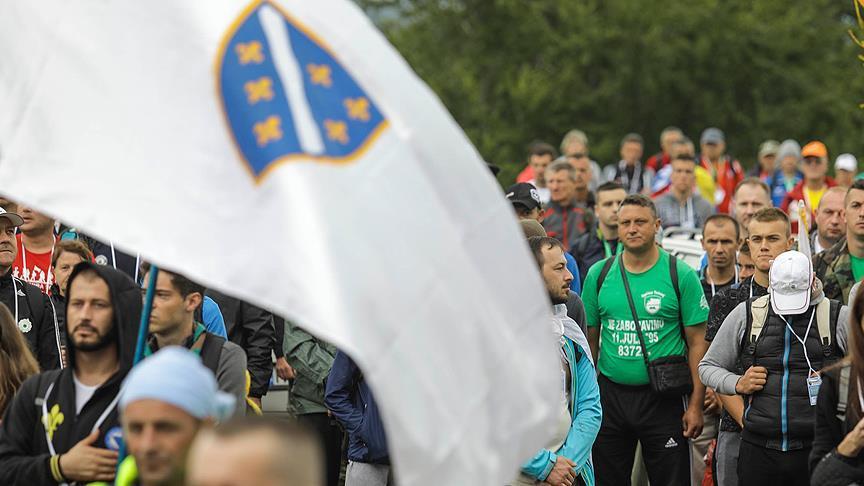Thousands march in Bosnia to honor Srebrenica victims
More than 6,000 people participating in annual Peace March

Belgrade
By Talha Ozturk
SARAJEVO, Bosnia and Herzegovina
Thousands of people from all over the world set off Sunday on a three-day peace march in Nezuk town near the Bosnian city of Tuzla to commemorate the 23rd anniversary of the Srebrenica genocide.
More than 6,000 participants, who began gathering at the town since the early morning hours, will cover a total distance of approximately 100 kilometers (62 miles).
The walk is expected to conclude at a cemetery in Potocari, a village in eastern Bosnia-Herzegovina, just northwest of Srebrenicatown, where a funeral prayer and burial ceremony will be held for 35 genocide victims.
Participants will travel about 35 kilometers (22 miles) each day to reach Potocari within the scope of the "Peace March" organized for the 13th time this year, and will be spending the nights at designated wooded areas.
During the long walk, they will be also given details about the genocide and told of the memories of survivors who took the so-called "Death Road".
Mario Dolquier from Belgium, who took part in the march, said he was informed about the march during his visit to the Potocari Monument Cemetery in Srebrenica.
"I am participating for the first time in this march," Dolquier said.
Kadir Suljic, a 16-year-old boy from Bosnia's Gradacac city, said that it is his first time in the march and he is proud to commemorate the victims of the genocide.
The organizing committee said that the peace march has turned into a “global activity.”
Since 2005, thousands of people have attended the Mars Mira (Peace March in English), which follows the same forest path that was used by Bosniaks when they were fleeing the Srebrenica genocide. The path from Srebrenica to Tuzla is commonly known as the "Death Road".
Srebrenica was besieged by Serb forces between 1992 and 1995 during the Bosnian War. Back then, Serb militias were trying to wrest territory from Bosnian Muslims and Croats to form their own state.
The UN Security Council had declared Srebrenica a "safe area" in the spring of 1993. However, Serb troops led by General Ratko Mladic -- who now faces genocide charges at The Hague -- overran the UN zone despite the presence of around 450 Dutch soldiers tasked with protecting innocent civilians as UN peacekeepers.
The Dutch troops failed to act as Serb forces occupied the area, killing about 2,000 men and boys on July 11 alone. Some 15,000 Srebrenica men fled into the surrounding mountains but Serb troops hunted down and slaughtered 6,000 of them in the forests.
A total of 6,504 victims lie buried at the Srebrenica Genocide Memorial in Potocari.
Anadolu Agency website contains only a portion of the news stories offered to subscribers in the AA News Broadcasting System (HAS), and in summarized form. Please contact us for subscription options.


